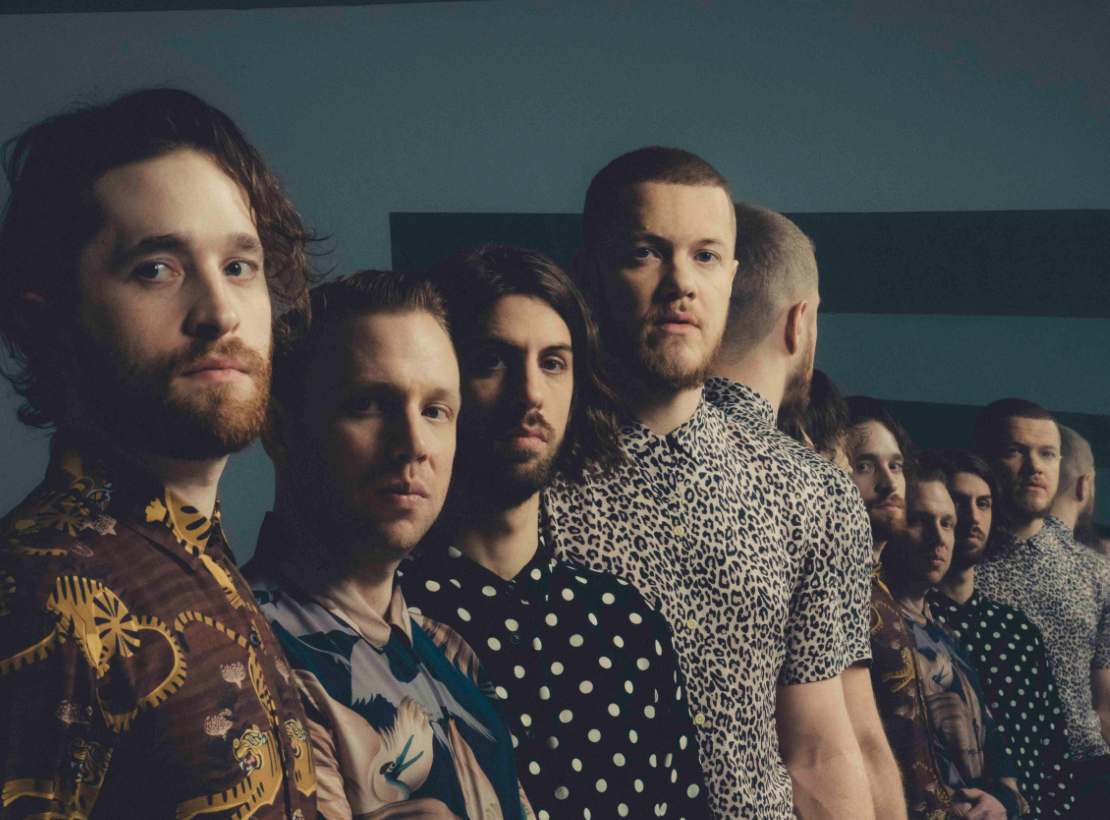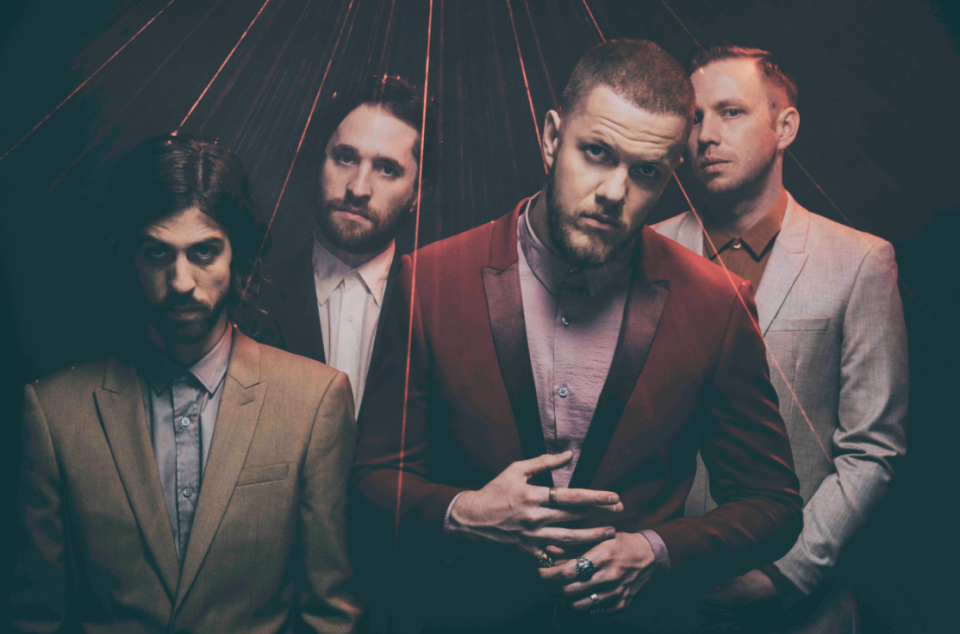Imagine Dragons interview: 'LGBT youth in Mormonism are being told their innate sense of being is flawed – that does a lot of damage'

“Every artist at the Grammys – when you’re looking at them on screen and you see their faces – all they’re thinking is, ‘Dammit are we next?’”
Imagine Dragons frontman Dan Reynolds is explaining the relief of being able to just sit and watch the Grammy Awards, because the pressure of singing in front of hundreds of your peers is, understandably, quite terrifying.
“It’s impossible to be in the moment and enjoy it,” he says. “The most intimidating performances we’ve ever done were playing Fleetwood Mac for Fleetwood Mac (at a Stevie Nicks tribute performance during Grammys week), and playing The Beatles’ “Revolution” in front of Paul McCartney. You’re thinking, ‘There’s no way we can do this justice, and they’re watching us do it’. The Grammys has that kind of vibe.”
He, bassist Ben McKee and I are sat in a weird kind of meeting room at a Manhattan hotel ahead of the 60th Grammys ceremony, where Imagine Dragons were nominated for best pop vocal album and best pop group performance. Four years ago they took home the Grammy for best rock performance for “Radioactive”, and also blew the audience away with an incendiary mashup of that same track and Kendrick Lamar’s “m.A.A.d City”.
“That was a cool night,” Reynolds says, “we had a lot of fun. Kendrick is amazing, and deserves all that hype, and he’s a good human being too – I think people sense that. He’s so willing to be creative and get into something different.”
While they’ve teamed up on a few occasions with different artists – including for the brilliant “Sucker For Pain” featuring Lil Wayne, Wiz Khalifa, Logic, X Ambassadors and TY Dolla $ign – their own albums are feature-free; they prefer to avoid the current trend of having 10 or more guest artists on one record.
“It’s all the hype right now, but it’s not what I grew up on,” Reynolds shrugs. “Not that it’s a bad thing to do, but the bands I listened to ... I would buy their album and I wanted to hear 10-plus tracks from that artist. So we’re really particular about who we work with, rather than thinking about who’s all the rage right now, as some forced thing.” He makes a half-hearted attempt at a British accent: “It’s not our cup of tea.”
“I think it’s really important – whatever you’re doing – to be honest with it,” he continues. “Fans are much more intelligent and intuitive than artists know or give credit to. If it comes from a place that’s not authentic, people can read right through it. As long as you’re doing you, nobody can argue with that. But when you’re jumping on something because of a trend to sell records – that’s the demise of an artist.”
He pauses, grinning. “But who knows, maybe next year we’ll put out a reggaeton album. You have my permission to call us out if that ever happens.”
Their latest album Evolve saw the band work with acclaimed musician Justin Tranter, whose songwriting credits including Justin Bieber, Britney Spears, Kesha. Selena Gomez and Camila Cabello. While Reynolds still writes the band’s lyrics, he says it was “incredible” to work with someone who helped bring out a new side of him as a writer, and the band as a whole.
“I think it really allowed us to go to some different places, it made us speak a little more clearly as a group,” McKee suggests. “We were able to be creative and keep throwing all these ideas out, but also have an outside voice focus all of that, trim the fat and pull us back to the texture we were chasing.”
“The people who get acknowledged the least are co-writers,” Reynolds says. “Justin is so key … he never begged for the credit on a song, but he deserves to be seen, because he is a talented artist who’s been doing rad s**t for a long time.”
“With this album Dan was really coming from a place where he was more sure of himself,” McKee notes of Reynold’s songwriting. “We’d had some time off to connect with our lives outside the band, so there was less of that ‘trying to figure out what the hell is going on’.” He looks to Reynolds: “It felt like you were writing from a more declarative place, more clear about where you were.”
Something the band learned from their latest album was how constructive it could be to take longer periods between releasing new music, allowing for more time to re-examine themselves and their work. Where their second record Smoke + Mirrors followed swiftly on from their hit debut and an exhausting global tour, Evolve seemed like more of a considered, careful recording process.
“An album and a tour cycle is a really big thing to take on,” McKee nods, “physically and psychologically it removes you from everything that isn’t Imagine Dragons. You forget who you were before the band, and the more you get wrapped up in that, the more you’re affected by something like a bad piece of press. You need to have balance.
“I think you can hear a little bit of sickness in Smoke + Mirrors, not bad music, but there’s a beautiful brokenness to it. But we write and make better music when we’re coming from this more empowered place and we enjoy performing it more; it makes for a better tour and experience for all of us.”

Reynolds is one of several artists to speak openly about his battles with depression, which he has dealt with over the years “on a really heavy level”. Both he and McKee believe it’s important to be frank about mental health, about having a therapist (“people are afraid of that word”), and says there’s almost an obligation for artists to make sure their fans know they’re often going through the same issues.
When McKee was a teenager he was sent to therapy “as a punishment”, he says, and loathed every moment because it was implied that it was something to be ashamed of. “Still to this day I’m working to get over that,” he says.
Reynolds and guitarist Wayne Sermon both grew up as members of the Church of Jesus Christ of Latter-Day Saints – or the Mormon church – and the band have been raising awareness of the issues involving LGBT+ youth within that religion: Reynolds fronts the Don Argott-directed documentary Believer – premiered at Sundance Film Festival – where he visits with heartbroken parents of gay children and teenagers who took their own lives after being rejected by their church; meets other teenagers who have managed to navigate their faith and sexuality.
“I was kicked out of BYU (Brigham Young University) – a Mormon college – for having sex with my girlfriend,” he says. “It was this really strange thing of feeling, like this was a beautiful thing in my life yet I was supposed to feel bad about it. It was really the first time I dealt with depression. I had to stay at home, live with my parents while all my friends went off to college. It was a really shameful process for me, being made to feel bad about something that should have been celebrated.
“That did a lot of damage to me, and still has, to this day. And that’s on such a minor scale compared to what our LGBT+ youth in Mormonism deal with, which is being told their innate sense of being and sexuality is flawed and that they should feel bad about it. In Utah the number one reason for death among teenagers is suicide, that’s likely a lot to do with the shaming – Utah is basically all Mormons.
“There are also statistics that show if an LGBT youth is not accepted in their home or environment they’re eight times more likely to take their own life. Three times more likely to take part in risky drug use. It’s a broken culture, that needs to be fixed, and the first step is hopefully shining a light on it. Because Mormons don’t want to talk about it. And it’s not just Mormonism, it’s all Orthodox religion.”
He’s bugged by people who try to brush off the issue by suggesting teenagers should simply “leave the religion”. Of course it isn’t that easy, a frustrated Reynolds points out: “You’re asking the kid to to get kicked out of their home, and that increases their risk of suicide. These kids didn’t choose their religion, and they didn’t choose their sexuality either.”
Much of Reynold’s desire to shine a light on the issues within Mormonism stem from an episode of the musical dramedy Glee, which featured a cover of Imagine Dragons’ song “It’s Time” by an LGBT+ character sending an encouraging message to his love interest. It sparked a surge of messages to Reynolds from Imagine Dragons fans who assumed – because he was raised Mormon, and is a straight, married father – he wouldn’t support their sexuality.
“It’s impossible for me to reach out to all of those people and respond to each one just to say, ‘That’s not true, I support you 100 per cent’,” he says. “But because that’s my culture, that’s my history … Mormons were at the forefront of fighting against marriage equality for gay couples, so there’s a lot of ground to make up.
“The last couple of years have been the first time in my life where I’ve allowed myself to follow my heart regardless of whether it’s going to offend people along the way. I was raised in a home where you were taught not to rub society up the wrong way. To never offend people. Now I’ve just decided if you’re not offending people you’re doing something wrong, you’re not trying to make progress. To make progress you have to have hard discussions – sometimes you have to be offensive.”
Imagine Dragons’ new single ‘Next To Me’ is out now – they are currently on tour in the UK. ‘Believer’ – the documentary about LGBT+ youth and the Mormon church, was produced via Live Nation Productions and is set to be released by HBO this summer.

 Yahoo News
Yahoo News 
